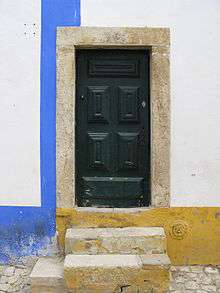Definify.com
Webster 1913 Edition
Porta
‖
Por′ta
,Noun.
pl.
Portæ
(#)
. [L., a gate. See
Port
a hole.] (Anat.)
(a)
The part of the liver or other organ where its vessels and nerves enter; the hilus.
(b)
The foramen of Monro.
B. G. Wilder.
Definition 2026
porta
porta
English
Noun
porta (plural portae)
- (anatomy) The part of the liver or other organ where its vessels and nerves enter; the hilum.
- (anatomy) The foramen of Monro.
- (Can we find and add a quotation of B. G. Wilder to this entry?)
Asturian
Verb
porta
Catalan
Etymology
Noun
porta f (plural portes)
Verb
porta
- third-person singular present indicative form of portar
- second-person singular imperative form of portar
Galician
Etymology
Noun
porta f (plural portas)
Synonyms
- (entrance): entrada
Antonyms
- (entrance): saída
Verb
porta
Hungarian
Etymology
Pronunciation
- IPA(key): [ˈportɒ]
- Hyphenation: por‧ta
Noun
porta (plural porták)
Declension
| Inflection (stem in long/high vowel, back harmony) | ||
|---|---|---|
| singular | plural | |
| nominative | porta | porták |
| accusative | portát | portákat |
| dative | portának | portáknak |
| instrumental | portával | portákkal |
| causal-final | portáért | portákért |
| translative | portává | portákká |
| terminative | portáig | portákig |
| essive-formal | portaként | portákként |
| essive-modal | — | — |
| inessive | portában | portákban |
| superessive | portán | portákon |
| adessive | portánál | portáknál |
| illative | portába | portákba |
| sublative | portára | portákra |
| allative | portához | portákhoz |
| elative | portából | portákból |
| delative | portáról | portákról |
| ablative | portától | portáktól |
| Possessive forms of porta | ||
|---|---|---|
| possessor | single possession | multiple possessions |
| 1st person sing. | portám | portáim |
| 2nd person sing. | portád | portáid |
| 3rd person sing. | portája | portái |
| 1st person plural | portánk | portáink |
| 2nd person plural | portátok | portáitok |
| 3rd person plural | portájuk | portáik |
Italian
Porta (door)
Etymology 1
Pronunciation
Noun
porta f (plural porte)
Related terms
Etymology 2
Inflected form of portare.
Verb
porta
Derived terms
Anagrams
Ladin
Verb
porta
- third-person singular present indicative of porter
- third-person plural present indicative of porter
- second-person singular imperative of porter
Latin

Porta Borsārī, Vērōnae
Etymology 1
From the Proto-Indo-European root *per- (“to pass through”). Confer with portus, Ancient Greek πόρος (póros, “means of passage”).
Pronunciation 1
- (Classical) IPA(key): /ˈpor.ta/, [ˈpɔr.ta]
- (Ecclesiastical) IPA(key): /ˈpor.ta/
Noun
porta f (genitive portae); first declension
Inflection
First declension.
| Case | Singular | Plural |
|---|---|---|
| nominative | porta | portae |
| genitive | portae | portārum |
| dative | portae | portīs |
| accusative | portam | portās |
| ablative | portā | portīs |
| vocative | porta | portae |
Derived terms
Descendants
See also
Pronunciation 2
- (Classical) IPA(key): /ˈpor.taː/
Noun
portā
- ablative singular of porta
References
- porta in Charlton T. Lewis and Charles Short (1879) A Latin Dictionary, Oxford: Clarendon Press
- porta in Charlton T. Lewis (1891) An Elementary Latin Dictionary, New York: Harper & Brothers
- PORTA in Charles du Fresne du Cange’s Glossarium Mediæ et Infimæ Latinitatis (augmented edition, 1883–1887)
- Félix Gaffiot (1934), “porta”, in Dictionnaire Illustré Latin-Français, Paris: Hachette.
- Meissner, Carl; Auden, Henry William (1894) Latin Phrase-Book, London: Macmillan and Co.
- to go outside the gate: extra portam egredi
- to barricade a door (a city-gate): valvas (portam) obstruere
- to be on duty before the gates: stationes agere pro portis
- to break down the gates: claustra portarum revellere
-
(ambiguous) to barricade the gates: portas obstruere (B. G. 5. 50)
-
(ambiguous) to break down the gates: portas refringere
- to go outside the gate: extra portam egredi
- porta in Harry Thurston Peck, editor (1898) Harper's Dictionary of Classical Antiquities, New York: Harper & Brothers
- porta in Ramminger, Johann (accessed 16 July 2016) Neulateinische Wortliste: Ein Wörterbuch des Lateinischen von Petrarca bis 1700, pre-publication website, 2005-2016
- porta in William Smith et al., editor (1890) A Dictionary of Greek and Roman Antiquities, London: William Wayte. G. E. Marindin
Etymology 2
Inflected form of portō (“carry, bear”)
Pronunciation
- (Classical) IPA(key): /ˈpor.taː/
Verb
portā
- singular present active imperative of portō
Portuguese

Porta
Etymology
From Old Portuguese porta, from Latin porta.
Pronunciation
- (Brazil) IPA(key): /ˈpɔχ.tɐ/, /ˈpɔɾ.tɐ/
- (Caipira) IPA(key): /ˈpɔɹ.tɐ/
- (Portugal) IPA(key): /ˈpɔɾ.tɐ/
- (Northeast Brazil) IPA(key): /ˈpɔh.tɐ/, /ˈpɔ.ʈɐ/
- Hyphenation: por‧ta
Noun
porta f (plural portas)
- door
- 2005, Lya Wyler (translator), J. K. Rowling (English author), Harry Potter e o Enigma do Príncipe (Harry Potter and the Half-Blood Prince), Rocco, page 180:
- Se você não abrir a porta, vamos arrombá-la!
- If you are not going to open the door, we will break it down!
- Se você não abrir a porta, vamos arrombá-la!
- 2005, Lya Wyler (translator), J. K. Rowling (English author), Harry Potter e o Enigma do Príncipe (Harry Potter and the Half-Blood Prince), Rocco, page 180:
- entrance
- (by extension) gateway
- (by extension) solution
- (computing) port (connector of an electronic device)
Synonyms
Derived terms
- ao pé da porta
- à porta fechada
- porta do cavalo
- porta giratória
Verb
porta
- third-person singular (ele and ela, also used with você and others) present indicative of portar
- second-person singular (tu, sometimes used with você) affirmative imperative of portar
Spanish
Verb
porta
- Informal second-person singular (tú) affirmative imperative form of portar.
- Formal second-person singular (usted) present indicative form of portar.
- Third-person singular (él, ella, also used with usted?) present indicative form of portar.